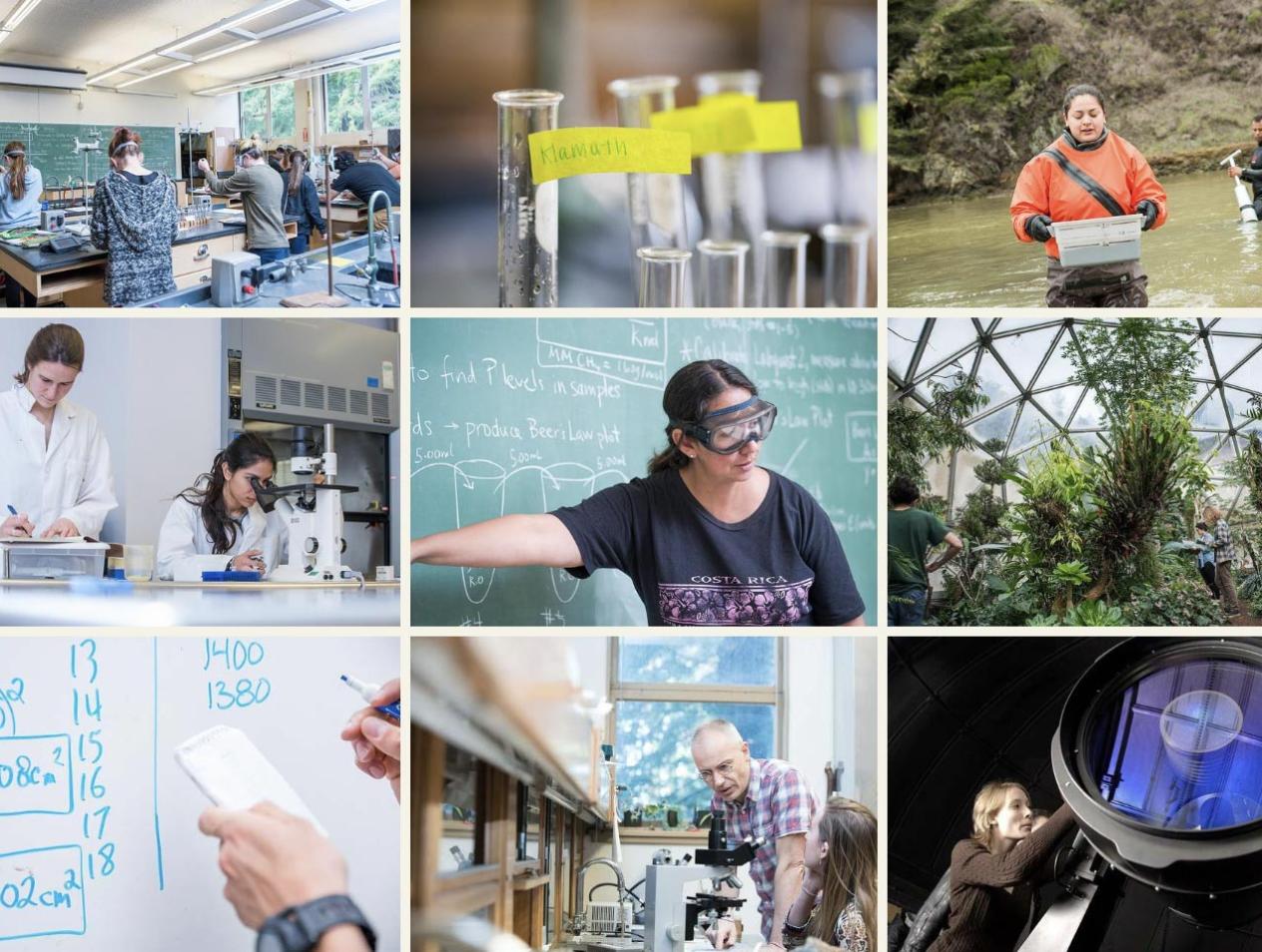Breadcrumb
Achievements
Find out what our students, faculty, and staff are being recognized for.
Laurie Richmond, Mary Mangubat, Erik Meusborn, and Andrew Todd
Environmental Science & Management
Cal Poly Humboldt students from the Environmental Science & Management (ESM) major Mary Mangubat, Erik Meusborn, and Andrew Todd are co-authors on a recent publication in the Journal Frontiers in Sustainable Food Systems. The publication is titled Fisheries of the middle: building collaborations between seafood and agriculture to revitalize and enhance mid-scale food production. The research began as an undergraduate research project in the ESM Planning & Policy capstone class where students were exploring common challenges among the seafood and agriculture systems in our local region -- working for community clients Ashley Vellis (Ashely's Seafood) and Megan Kenney (North Coast Growers' Association). It then evolved to include the ideas and voices of many other scholars and practitioners working in seafood and ag systems. The piece argues for the development and sustenance of "middle scale" seafood systems in addition to those focused on smaller-scale or direct-marketing strategies.
Sherrene Bogle
Computer Science
Dr. Sherrene Bogle received a travel award to attend the NSF ACCESS Regional AI Workshop on January 22, 2026 at University of Southern California. She presented a poster on "ACOSUS - An AI-driven Counseling System for Transfer Students". The NSF funded ACOSUS, on which Dr. Bogle is a co PI, is designed to complement existing advising by providing personalized readiness assessments, success predictions, and actionable recommendations for computing transfer students.
Dr. Sarah Jaquette Ray
Environmental Studies
Dr. Sarah Jaquette Ray interviewed Alexander Menrisky, author of a new book called Everyday Ecofascism, about the violent side of environmental politics for the University of Wisconsin web-magazine and podcast, Edge Effects. You can find the interview and more about the book here: https://edgeeffects.net/alexander-menrisky/
J.R. Patton, S.W. Smith, A. Lomax, M. Hellweg, L. Dengler, D.S. Dreger
Geology
I have been invited by the United States Geological Survey to speak at their annual Northern California Earthquake Hazards Workshop (February, 2026) to discuss a recent paper of which I was lead author. The paper is entitled "Large Repeating Gorda Intraplate Earthquakes Occurring Along an Inherited Weak Zone near the Mendocino Triple Junction" and summarizes a new way to look at offshore earthquake hazards. It was published in the Seismological Research Letters journal (DOI: 10.1785/0220250005).
Erika Anderson, Micaela Gunther, Marie Martin, Kristine Pilgrim, Scott Demers, Sean Matthews
Wildlife
Former wildlife graduate student Erika Anderson published her thesis research on state-endangered Humboldt martens in the journal Global Ecology and Conservation. This research is published open access and aims to establish a baseline for an endangered population that will inform future monitoring to estimate apparent survival and recruitment, additional relationships to environmental conditions and change, and demographic trends over time. https://doi.org/10.1016/j.gecco.2025.e03980
Melanie Michalak, Susan Cashman
Geology
Melanie Michalak (Geology) and Susan Cashman (Geology) published a paper in the Journal of Geology with co-authors Kevin Furlong (lead author; Penn State) and Paul O'Sullivan (GeoSep Services) titled "Tectonic Response to Siletzia Terrane Accretion Recorded in the Thermal and Displacement History of the Klamath Mountains Province". This work in the northeastern Klamath Mountains reconstructs how the landscape responded after a major tectonic terrane (the Siletz terrane) collided with the edge of North America about 50 million years ago. Their findings show that the effects of this collision were widespread over hundreds of kilometers and lasted tens of millions of years. Read the paper here.
Catalina Cuellar-Gempeler
Biological Sciences
Professor Catalina Cuellar-Gempeler's BIOL 412 General Microbiology class has published another successful volume of the Humboldt Journal of Microbiology, accessible at https://digitalcommons.humboldt.edu/hjm/. Congratulations to student authors Natalie S. Kozlowski, Leighanna Jake, Theo P. Murphy, Eve Wendley, Justice Laskowski, Tyler Paredes, Quigley D. Espinola, Scarlet Renner, Curtis Cline, Sophia Lopez-Orenday, Alex Yasumatsu, Mariska M. Kessler, Jocelyn Wolfinger, Destiny S. Alcaraz, Isabella N. Cerrone, Brooke Pirkle, Danielle Williamson, Gianna Vendrell, Chloe Kraft, Ryan A. Solorzano, Justin Paulin, Grayson Prater, Michael Lanier, Noah S. Schuhmann, Andrew McLaughlin, and Julian Barreran.
Elizabeth Meisman, Jadzia Rodriguez, Lauren Jackson, Ayla Zolwik, Matt Johnson
Wildlife
Four Wildlife graduate students (Elizabeth Meisman, Jadzia Rodriguez, Lauren Jackson, Ayla Zolwik) and their advisor (Matt Johnson) each presented their latest research findings at the 2025 Raptor Research Foundation's annual conference, held Oct. 13-18, in San Jose, Costa Rica.
Sherrene Bogle
Computer Science
Prof. Sherrene Bogle received a travel award from the University of Missouri, Kansas City to attend the 2025 Workshop on Large Language Models for CS Undergraduate Education. At the September 2025 workshop, she gave a presentation on “Experience Report of Generative AI for Contrasting Undergrad Courses”. This included how generative AI tools have evolved in the past two years to student prompts and best practices for incorporating the tool in both GE and STEM courses.
Sherrene Bogle, Cheyenne Ty
Computer Science
Prof. Sherrene Bogle, 2024-25 student of the year Cheyenne Ty and their collaborators in the NSF funded ACOSUS (AI Counseling System for Under-represented Transfer Students) research group had their double blind peer review paper entitled School or Student? A Mixed Method Analysis on Reddit Data for Transfer Barrier Identification was accepted for publication and presentation at the 2025 Decision Sciences Institute Annual Conference in November. The paper examines the institutional and student-based barriers faced by computing transfer students.






